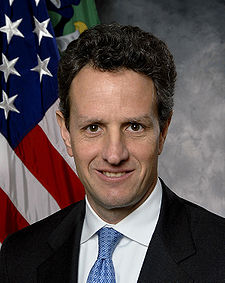
The venture capital industry is up in arms about U.S. Treasury Secretary Timothy Geithner’s plans to include venture firms in his plan to increase regulatory oversight over private investment vehicles of all stripes. In a strongly worded op-ed today, the Wall Street Journal lays out the argument against lumping in venture capital with hedge funds and the whole Madoff crew on Wall Street that got us into this economic pickle in the first place.
The WSJ is correct to point out that venture firms pose little systemic risk to the global economy and financial markets because A) the $30 billion invested in venture capital every year is a minuscule amount representing less than 0.1% of all financial transactions in the U.S. and B) venture firms use very little to zero debt, eliminating the compounding effects that over-leveraged investments in other sectors bring. There is no systemic threat here, the Journal argues, so back off Geithner.
We pretty much agree. Except, what did Geithner actually say to bring about such vigorous defense? Well, if you go back to his testimony before Congress on March 26, he mentions venture capital only once as an aside:
Accordingly, we recommend that all advisers to hedge funds (and other private pools of capital, including private equity funds and venture capital funds) with assets under management over a certain threshold be required to register with the SEC.
Does he really intend to go after the venture capital industry, or is he merely trying to close a loophole for hedge funds and other private equity funds to avoid disclosure by reclassifying assets as venture investments? He also makes clear that any such reporting will remain confidential and the purpose will be to “assess whether the fund or fund family is so large or highly leveraged that it poses a threat to financial stability.” If that is the case, I’d say 98 percent of venture funds really don’t have anything to worry about. And as long as that asset threshold is set high enough (firms with multiple billions of dollars under management), the reporting requirements won’t affect most firms and won’t be terribly onerous for the ones that are large enough to warrant scrutiny. But some clarity on what those thresholds will be would be nice.
Here is the full passage of Geithner’s perpared remarks that dealt with regulation of hedge funds and venture capital:
Hedge Funds and Other Private Pools of Capital
U.S. law generally does not require hedge funds or other private pools of capital to register with a federal financial regulator, although some funds that trade commodity derivatives must register with the CFTC and many funds register voluntarily with the SEC. As a result, there are no reliable, comprehensive data available to assess whether such funds individually or collectively pose a threat to financial stability. However, in the wake of the Madoff episode it is clear that, in order to protect investors, we must close gaps and weaknesses in regulation of investment advisors and the funds they manage.
Accordingly, we recommend that all advisers to hedge funds (and other private pools of capital, including private equity funds and venture capital funds) with assets under management over a certain threshold be required to register with the SEC. All such funds advised by an SEC-registered investment adviser should be subject to investor and counterparty disclosure requirements and regulatory reporting requirements. The regulatory reporting requirements for such funds should require reporting, on a confidential basis, information necessary to assess whether the fund or fund family is so large or highly leveraged that it poses a threat to financial stability. The SEC should share the reports that it receives from the funds with the entity responsible for oversight of systemically important firms, which would then determine whether any hedge funds could pose a systemic threat and should be subjected to the prudential standards outlined above.